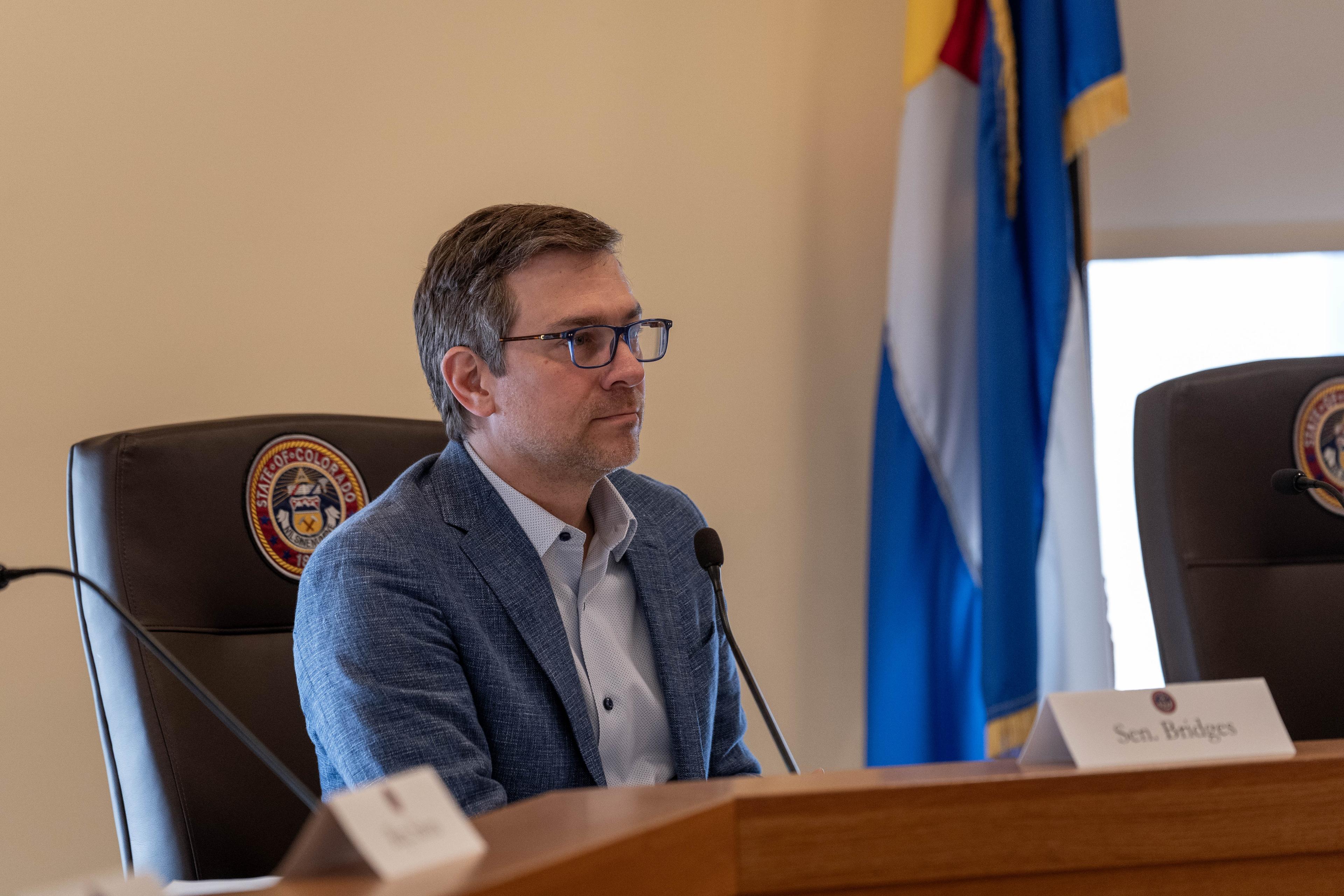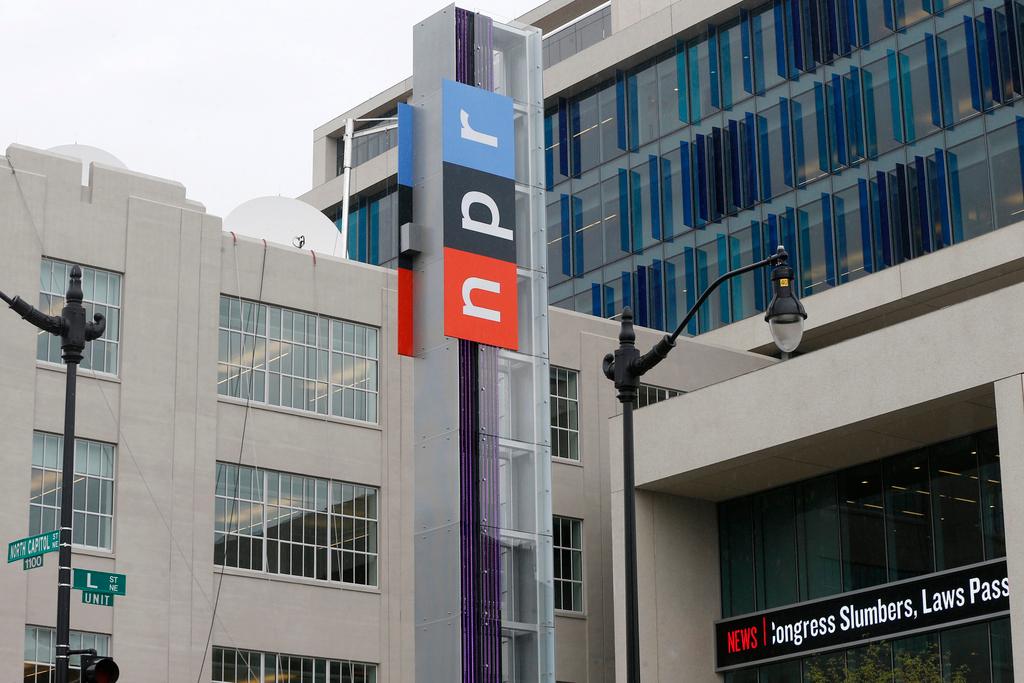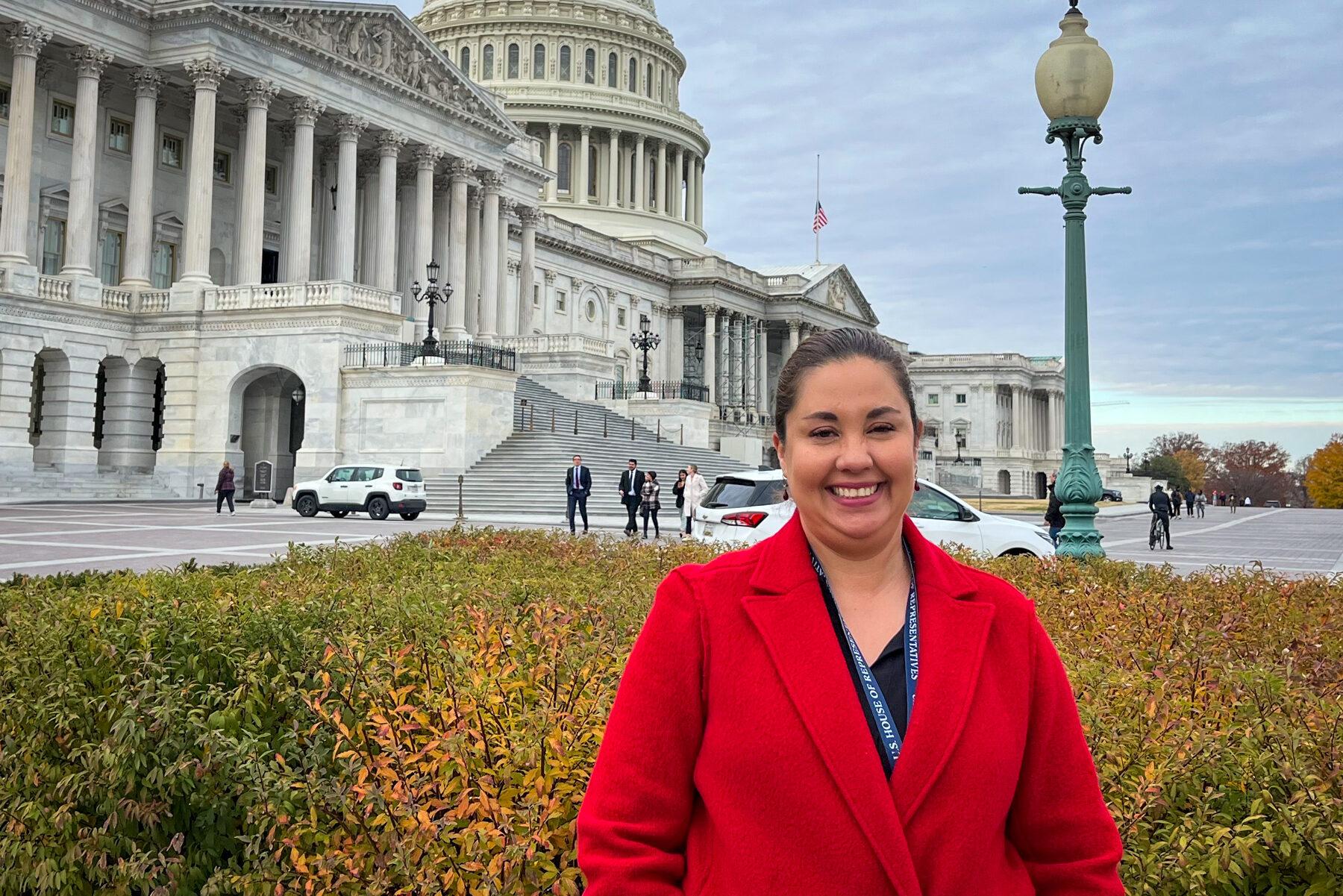
Updated with transcript -- There's a diversity problem in higher education, including at the University of Colorado, according to Heidi Ganahl. She's the new at-large regent at CU, having won a hotly contested statewide race in November, and her election keeps Republicans in the majority on the board of regents, 5-4.
She wants more conservative voices -- at the student, staff and faculty levels -- on all four of the school's campuses.
Ganahl spoke with Colorado Matters host Ryan Warner about her ideas to help broaden the diversity of thought at CU, and about the university's funding challenges, given the long-term decline in state funding for higher education. Ganahl hopes to bring her experience as an entrepreneur to help CU broaden its sources of funding. She founded the doggy daycare franchise Camp Bow Wow, which she sold in 2014.
Read a transcript of their conversation:
Ryan Warner: It's Colorado Matters from CPR News. I'm Ryan Warner. There's a diversity problem in higher education, including at the University of Colorado, according to our next guest. In particular, she means diversity of thought, specifically getting more conservative voices on campus. And Heidi Ganahl has the power to do something about it as a new regent for the CU system. She won the hotly contested statewide race and was sworn in last week. Ganahl may be best known for founding the doggy daycare chain, Camp Bow Wow, and Heidi, welcome back to the program. Heidi Ganahl: Oh, thanks for having me Ryan. RW: I also want to ask about making higher education more affordable in Colorado, that will come up in just a bit. But let's begin with this concern I mentioned. Do you see a liberal bias at CU? HG: Well, I think that's a national problem, not just a problem at CU and one that has been a hot topic lately in the news for the past year or so. So it's something that I certainly want to dig into a bit and address and make sure that students are hearing both sides of the story. It's very important to me. RW: Where do you see that bias manifest? HG: Well I think it's in a lot of different ways. It's, whether it's in the classroom or it's on the campus through groups that are hosting a booth on campus or even the voter registration, the spirit around that was interesting. And then also just generally what students are hearing and feeling in the college environment and also the press. But I do believe our universities are not the place to limit free speech and thought. They're the place for feisty debate about tough issues and letting students make their own decisions about what they believe. RW: What evidence do you have that it's happening in the classroom? HG: I hear from a lot of students and as I worked on the campaign trail for the last year. I mean that was probably the number one topic I heard about, besides the high cost of college, was what is going on on our college campuses and why are our kids coming home from college telling us these stories about what's happening in the classroom, or what's happening, if they have a thought or an opinion that's not along the lines of what everyone thinks they should think. And it's a scary proposition and one that I dealt with personally. I have a senior at the University of Oregon, my daughter goes there. And I can count probably twenty times she's come home and told me stories about that and it's very concerning. RW: Is there a school that has taken this on and done so successfully, that you think CU could emulate? HG: Well honestly I think CU's doing some of the right things to address this issue, in bringing lots of different voices to the campus and the conservative chair program at CU Boulder is a great start. But there's a lot more work to do and I think that Robbie George at the James Madison Institute at Princeton is a great example and there's some pockets around the country that are doing good things too. So I'm going to do a bit more research and talk to some folks around the country and go to some conferences to learn more about it. And so maybe in six months or a year, I'll have a better view on that. RW: Do you want to expand at all on what's happening at Princeton? HG: It's like a think tank on the campus, but the most popular part of the institute there is a class that is co-taught by a very liberal professor, and a very conservative professor. And the kids love it. It's always full, there's always a waiting list to get a class, and that's just an example of how students really do want to hear both sides of the story and have feisty debate about tough issues and have conversations about things that they really need to figure out where they stand on. RW: You did mention the fact that CU added a conservative thought and policy scholar, I'll say it's in fourth year. And is that the way to go about this, to create positions designed to be filled by people with conservative ideologies, or are there other pathways do you think? HG: You know I think it's a good idea, I think it's a good symbol for what we're trying to accomplish. But at the end of the day, every hiring decision should have the background of diversity of thought, of race, religion, of idea, all of those things should go into who we bring onto our campus to teach our children or to run the campus. I think it's not just around political ideology but diversity in general. And I think that's a very important thing that we need to continue to focus on and bring to the University of Colorado, as I know a lot of universities around the country are struggling with right now. RW: So diversity does mean more than diversity in thought to you for sure. Does it matter an educators political persuasion, in all disciplines though? In other words, is it more important in political science, say than mathematics? I mean at some point does this become the 'thought police' in places where political persuasion is not as relevant? HG: Well we certainly don't want to go that far as far as talking about the 'thought police' but we certainly do want to look at every position on campus and making sure that we consider their, oh gosh, if they can be neutral and present a balanced view of whether it's mathematics, or it's history, or it's business, or it's political science. I don't think it's just focused on political science alone. RW: Every position. And you say that that's faculty, is it staff too? Is it students? HG: Yes, yes, of course. RW: All right. Have you given thought to a more fundamental question, that is, is it more likely liberals join higher ed, than conservatives? Is it something of a pipeline in academia? HG: Well I certainly think that is part of the issue and something that I've heard a lot about from conservative students on campus that don't really feel encouraged to move on to get their masters or PhD or teach at the universities. So I do, I actually think it starts in K through 12, and having feisty collaborative debate even among high schoolers and middle schoolers and talking about different philosophies and ways of approaching problems. And so I honestly hope that it's more of a general population discussion rather than just one that's tagged to higher ed. I think it's a societal issue, not just an issue for higher ed but it does show up a lot more in higher ed. RW: For context, I want to say that the Board of Regents at CU has been controlled by Republicans since 1979, Republicans currently hold a five/four majority with your election. I want to ask you about an event going on later this month at two CU campuses in Boulder, and Colorado Springs. So they're each hosting a controversial speaker, a guy named Milo Yiannopoulos who writes for Breitbart News. He was banned from Twitter for stirring up racist attacks online. His tour has a name I won't say on the radio because it uses a slur for gay people. He is openly gay himself. By all accounts he's a provocateur and perhaps most troubling for some is that in an appearance at a different school, he singled out a student for abuse, a transgender student at the University of Milwaukee, Wisconsin. I am not suggesting that Yiannopoulos is a mainstream conservative, but the groups sponsoring his tour are mainstream. Is CU going too far in hosting that speaker in particular on their campuses? HG: Well, I think that student groups invited him and sponsored his appearance, and we need to recognize their right to bring a variety of speakers and events to campus. Our campuses, especially CU are places where open debate, discussion, are encouraged, even from speakers that we disagree with or may have views that we don't all agree with. So I do understand that the campus is working with different groups that are concerned about his appearance to put on an alternate event for students that want to participate in that, that might be a good option. RW: Let me take this to an extreme and, I just want to be very clear that this is an extreme for argument's sake, if students wanted to invite the KKK on campus, should they be allowed to do that? Is there a place where you draw the line? HG: Well, honestly, I think universities are places for learning about yourself and others and the world and freedom of speech is a big part of that. I think part of robust debate and bringing that to our campuses is making sure that every square inch of our campus is protected by the First Amendment. And there are certainly ideas that most of us can't stand, but at the end of the day, I think if the KKK came to campus I doubt anyone, or very many people would show up. And so hopefully they wouldn't have much success in doing so. RW: But you think they should have the right to have a presence on a CU campus? HG: I think that student groups should have the right to sponsor any group that they want to bring to campus. RW: I want to say that some other universities have dis-invited this particular speaker, Milo Yiannopoulos from coming to campus. CU Chancellor Philip DiStefano has acknowledged protests by students who don't want the speaker on campus. He said in his statement, "As the Chancellor, it is also my duty to uphold our dedication to free expression of viewpoints on the campus, and to allow all student groups to host speakers of their choosing." Let's move onto another issue, CU Regent-at-Large Heidi Ganahl, about funding for higher education in Colorado, and the affordability of attending CU, students and their families are paying bigger portions of tuition than ever before, and the state is paying less. Colorado ranks near the bottom for higher ed funding in the country. Should CU plan for the day when there's just no state funding? I know it's already pretty minimal, but should it prepare for zero? HG: Well I think we're a little under six percent right now, so yes, it's getting near that point. I hope that's not the case. Part of what I want to do as a regent is continue to build relationships with Colorado legislators to maximize state funding and to talk about what a great return on investment higher education is for our state economy and for our children in Colorado. But I think we've got to do some things to prepare for less funding and I think CU's doing a lot on that front. I think they've kept tuition at the lowest level in a couple decades and they have the new four year freeze program at CU Boulder which is a step in the right direction. RW: On tuition, yeah. HG: Yeah. But there's lots, I think there's lots of work to do there and I think the Board of Regents acknowledges that and so does President Benson and everyone's rolled up their sleeves and constantly trying to work on that issue. RW: But my, it's a tough nut to crack and it's been an issue persistent for years, hasn't it? HG: It has and I think there's a lot of different ways to tackle it. I've been reading up a lot on this over the last year and I think I have a business perspective and that's how I tackle this issue, is look at you either have to create more revenue or drive down expenses. Those are the two levers you can pull. So I think we can focus on graduating students in four years so that will cost them less to get an education. I think we can leverage technology to drive down our costs. We can make it easier to transfer credits so if kids come in from community college or get credits in high school, it's a bit easier to apply those to your higher education goals. And then I think we can prepare high school students better so that a third of new college students don't have to take remedial classes. That's a tough issue as well. RW: What about on the revenue side? Do you risk making colleges and universities resemble for-profit companies? HG: Well I think right now, one thing CU's doing very well is breaking private fundraising records and creating that conversation with private donors and businesses about what a great investment it is to put donations or invest in higher education and kids getting higher education, or higher degrees. I think that's something we need to keep doing and we also need to continue to drive innovation through private/public partnerships. There's a lot of great examples at CU of that going on in the system. I think building a tighter bridge between businesses and K through 12 and higher education in our communities is really one of the ways you tackle this problem. RW: When you say public/private partnerships, I gather you're talking about technology transfer, at least in part, the idea that research that comes out of an institution can be transferred to the private sector. You make money on a particular technology or discovery and that benefits financially, the universities. Is that what you were getting at? HG: That's one way to do it. The cool thing about the Tech Transfer program is it also benefits the student and the faculty. Everybody shares in the success of that project. A good example, I think, of a public/private partnership is the new cyber security program down at UCCS. I think that was a really neat way that Governor Hickenlooper worked on it and President Benson worked on it. Chancellor Shockley worked on it. It became a really good model for how we can do some of these things. RW: Can you say just a few words about that for those unfamiliar with it? HG: Yeah. So one of the hot issues right now, of course, is cyber security and our military is very interested in research on that front and so is the private sector and so are our universities around the country. And so they put together a relationship between all three of those parties to create a program down at UCCS and some degree programs and some research programs that will focus specifically on cyber security. Colorado Springs is a good place to do that with the presence of the military and a lot of high tech companies that are worried about that issue. So I'm excited to see how that grows and where it leads us but that's one way we've taken that approach at CU. RW: Does the approach though, favor larger institutions, say like CU Boulder and disfavor those that are smaller and may not have as robust a technology transfer program or an ability to create those kinds of partnerships? HG: Do you mean other universities, like smaller universities? RW: Right, exactly. HG: Yeah, I mean, I don't think so. In every community, it's in the community's best interest and the businesses in that community's best interest to make sure that they are getting kids great degrees and giving them more education and training. So Even the smallest of communities with a community college can partner with local businesses and local non-profits in that community to make sure that kids are getting to college, if that's what they want to do. RW: I'd like to wrap up with a personal question. You were named by Forbes one of the 10 Most Promising Entrepreneurs of 2014. This was in part because of your connection to Camp Bow Wow, having founded it. I'm curious why you wanted to run for the CU Board of Regents. What attracts you to this job? HG: Well I love CU. I graduated from CU Boulder. I've been on various boards over the years, most recently the CU Foundation Board, but I've also been blessed to live the American Dream and I care very much about our kids getting the same opportunity that I had, to do what they love and to unleash their own American Dream. And I truly believe education is the key to keeping that American Dream alive. So after I sold my company, I was trying to figure out how I wanted to give back or what my next step was and my involvement at CU along with my focus on education and entrepreneurship, this was really a good next step for me to see if this is a good way I could give back to the community and the university that I love so much. RW: Thanks for your time. HG: Well thanks for having me. RW: Republican Heidi Ganahl won the hotly contested, statewide race to become a new CU Regent. She was sworn in last week. You can hear my earlier interview with her about the freak accident that changed the course of her life and led her to found that doggy day care company, Camp Bow Wow, at cprnews.org. This is Colorado Matters from CPR News. |








